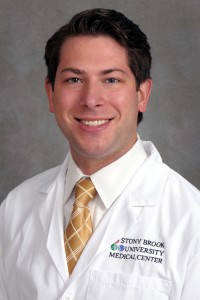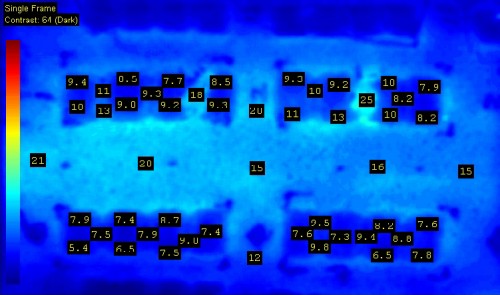Aiming to Predict Tissue Viability and Develop Artificial Tissue

Brett T. Phillips, MD, clinical assistant instructor of surgery, in the summer of 2010 was awarded one of two Clinical Research Scholar Awards sponsored by Stony Brook’s K30 Clinical Research Training Program funded by the National Institutes of Health.
A resident in our general surgery residency program and currently a research fellow, Dr. Phillips received the competitive grant award for his proposed research titled “Comparison of Clinically Quantitative Cutaneous Vascular Perfusion Techniques in Tissue-Engineered Constructs and Burn Injuries.”
Dr. Phillips’ one-year basic science study, initiated in July, uses noninvasive and minimally invasive perfusion techniques to investigate burn wound progression and lay the groundwork to develop artificial tissue constructs for improving patient care, in particular wound care.
There are over 11.8 million wounds and 500,000 burn injuries treated annually in emergency rooms nationwide, and wound care management can be improved.
Although the technology for engineered skin replacements is advancing, providing vascularization of replacement skin (establishing the network of blood vessels) is still a significant problem. Means of assessing vascular perfusion (blood flow) provide the first step in tackling this important problem. This is the objective of Dr. Phillips’ research.
Our goal is to find methods for the early determination of injury progression and of adequate perfusion in engineered skin constructs, in order to improve patient care.
Co-investigators of his study are Stony Brook faculty, who have served as his mentors: Adam J. Singer, MD, professor of emergency medicine and vice chairman for research; Steven Sandoval, MD, assistant professor of surgery and medical director of the Stony Brook Burn Center; Alexander B. Dagum, MD, professor of surgery and orthopaedics and chief of plastic and reconstructive surgery; and Richard A. Clark, MD, professor of biomedical engineering, dermatology, and medicine, and director of the Clinical Research Scholar Program.
Concerning the clinical significance of this research, Dr. Phillips explains: “Robust clinical trials for therapies to limit burn injury progression and for technologies to construct tissue-engineered flaps must utilize the best method for predicting tissue viability.
“As a result of our research, we can improve surgical outcomes by early determination of injury progression and be able to determine adequate perfusion in engineered skin constructs. Such assessments would overcome the critical issue of vascularization in bringing therapy to limit burn injury progression and providing the ability to create an unlimited supply of artificial tissue in a global problem of wound care.”
Dr. Phillips received his BA in biology from New York University and his MD from Stony Brook. In 2009, after completing two years of surgical training here, he became a research fellow in the Department of Surgery, participating in the Empire Clinical Research Investigator Program.
Following the completion of his current research in June 2011, Dr. Phillips will rejoin surgical training as a third-year resident. He plans to pursue a career in plastic surgery following completion of his general surgery residency.

